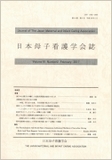Japanese
English
- 有料閲覧
- Abstract 文献概要
- 参考文献 Reference
目的
本研究の目的は、第2子を迎えた経産婦の産褥早期のケアニーズを引き出す助産師の関わりについて明らかにすることである。
対象と方法
平成27年6月から8月に都内大学病院産科病棟で第2子の出産を終えた産褥入院中の経産婦4名を対象とした。産褥入院中のケアと1か月健診でのインタビューからケアニーズを引き出す助産師の関わりについて質的に分析した。
結果
第2子を迎えた経産婦の産褥早期のケアニーズを引き出す場面として、授乳場面と第1子に対応する場面があった。
経産婦は、授乳時に第1子の育児で獲得した授乳経験を基盤として授乳を行っていた。この場面で第1子の新生児期の授乳経験を呼び起こすような関わりと授乳技術の修正を行ったところ、第1子と第2子の授乳を比較しながら、今後の見通しを立てて第2子に合わせた授乳が出来るようになった。
また、経産婦は妊娠中から第1子の変化を認識しており、退院後に赤ちゃん返りをした際にどのように対応したらよいかという不安を持っていた。これに対し、第1子への思いを語る機会を作った上で、幼児の心理的発達について情報提供を行ったところ、第1子の変化を成長と感じながら育児をすることが出来るようになっていた。
結論
第1子の育児経験は様々であり、ケアが必要な場面は共通していても、その中にあるケアニーズは事例によって異なっていた。経産婦のケアニーズに対応するためには、第1子の育児で得た技術や経験を呼び起こし、育児に対する自分の行動を振り返ること、考え方を語ってもらう機会を作ることが重要である。この語りが自己概念の再構築につながり、母親としての自己や満足感に気づく機会をつくることにつながると考える。
Purpose
The purpose of this study was to investigate midwives' involvement to induce second-time mothers' care-needs during early puerperium.
Method
The subjects were four second-time mothers(multiparas) who delivered from June to August 2015 at a university hospital in Tokyo. Midwives' involvement to induce their care-needs was qualitatively analyzed through care provided during puerperal hospitalization and interviews with them conducted at the time of postnatal health check after one month.
Results
Two care settings were considered as a situation to induce the second-time mothers' care-needs during early puerperium; one is a breast-feeding situation and the other is a situation for the mothers to cope with their first child.
These multiparas had breast-fed based on their experience gained at the time of first-child rearing. In this situation, we intervened so that they can recall their experience with breast-feeding to the first child and also corrected their breast-feeding skills. Thus, the mothers succeeded in appropriate breast-feeding tailored to the second child, by comparing the breast-feeding between the first- and second child and by having positive prospects for future.
Next, they had recognized some changes in the first child already from the pregnancy period, and they had had an anxiety how to cope with the first child if he/she would cause a "throwback-to-baby" phenomenon. We had an opportunity for them to tell what they feel toward the first child and, then, provided them with information on infant's psychological development. Thus, these mothers succeeded in appropriate childrearing by acknowledging the changes in the first child as development.
Conclusion
The experience of first-child rearing varies from person to person and, therefore, multiparas' care-needs were also different from person to person although the care-need situations were common. In order to cope with their care-needs, it is necessary to set up an opportunity for them to recall their skills and experience gained at the time of first-child rearing, examine own attitude toward childrearing and tell what they feel about childrearing. Such telling is considered to lead to re-construction of their self-concept and result in a chance to notice oneself as a mother and a sense of satisfaction.
Copyright © 2017, The Japan Maternal and Infant Caring Association All rights reserved.


